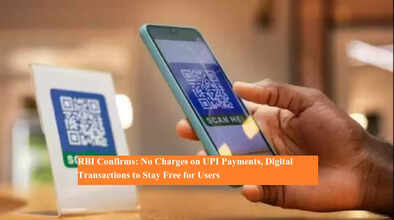RBI Confirms: No Charges on UPI Payments, Digital Transactions to Stay Free for Users

New Delhi, October 3, 2025 – In a major relief for millions of digital payment users across India, the Reserve Bank of India (RBI) has clarified that Unified Payments Interface (UPI) transactions will continue to remain free. Dismissing recent speculation about possible charges, RBI Governor Sanjay Malhotra assured that neither the central bank nor the government has any proposal to impose fees on UPI payments at present.
UPI has emerged as India’s most popular digital payment system, processing billions of transactions every month. With its ease of use and zero-cost model, it has become a backbone of the country’s digital economy. The RBI’s latest clarification not only strengthens consumer confidence but also supports India’s broader goal of promoting cashless transactions.
UPI to Stay Free – For Now
Governor Malhotra emphasized that there is no immediate plan to introduce fees for UPI transfers. However, he also acknowledged that operating the system involves costs, which are currently subsidized by the government and RBI. While UPI may not remain free forever, the central bank stressed that, for now, digital payments will remain accessible without any additional charges.
The announcement comes amid speculation that reduced government subsidies in the Union Budget could eventually lead to transaction fees. By rejecting such rumors, RBI has provided much-needed clarity to consumers and businesses who rely heavily on UPI for day-to-day financial activities.
Balancing Costs and Consumer Access
Although free for users, UPI involves infrastructure, security, and operational expenses that banks and payment companies bear. According to Malhotra, the challenge is to balance these costs while ensuring that digital transactions remain affordable for all sections of society.
RBI Deputy Governor M. Rajeshwar Rao also revealed that the central bank is exploring innovative ways to protect financial institutions. One such proposal includes allowing banks to remotely “lock” mobile phones purchased on loans if customers fail to repay their EMIs. While still under review, this idea aims to safeguard lenders, though it raises questions about privacy and consumer rights.
A Boost for Digital Economy and Financial Inclusion
RBI’s stance aligns with India’s broader digital transformation journey. By keeping UPI free, the central bank ensures that millions of people, from urban professionals to rural users, can adopt digital transactions without financial barriers. This decision not only reduces dependency on cash but also promotes financial inclusion by enabling small businesses, students, and daily wage earners to transact seamlessly.
The ripple effects were seen immediately in the stock market, with fintech companies such as Paytm witnessing a surge in share prices following RBI’s announcement. Industry experts believe that free digital transactions will further strengthen consumer trust in digital wallets, mobile banking, and other fintech innovations.
Economic Outlook Remains Positive
In its monetary policy review, the RBI also revised India’s GDP growth forecast for 2025–26 to 6.8%, citing resilient domestic demand and easing inflationary pressures. This optimistic outlook underscores the central bank’s confidence in India’s economic momentum, supported by robust digital infrastructure and financial reforms.
What This Means for Consumers
For everyday users, the message is clear: continue using UPI without worrying about extra charges. Whether it’s paying grocery bills, booking tickets, transferring money to family, or settling monthly utilities, UPI remains a zero-cost, instant, and secure option.
While the RBI has not ruled out future changes, its present commitment ensures that digital payments stay widely accessible. For now, UPI will remain the lifeline of India’s digital economy, empowering millions to embrace cashless transactions with ease.

